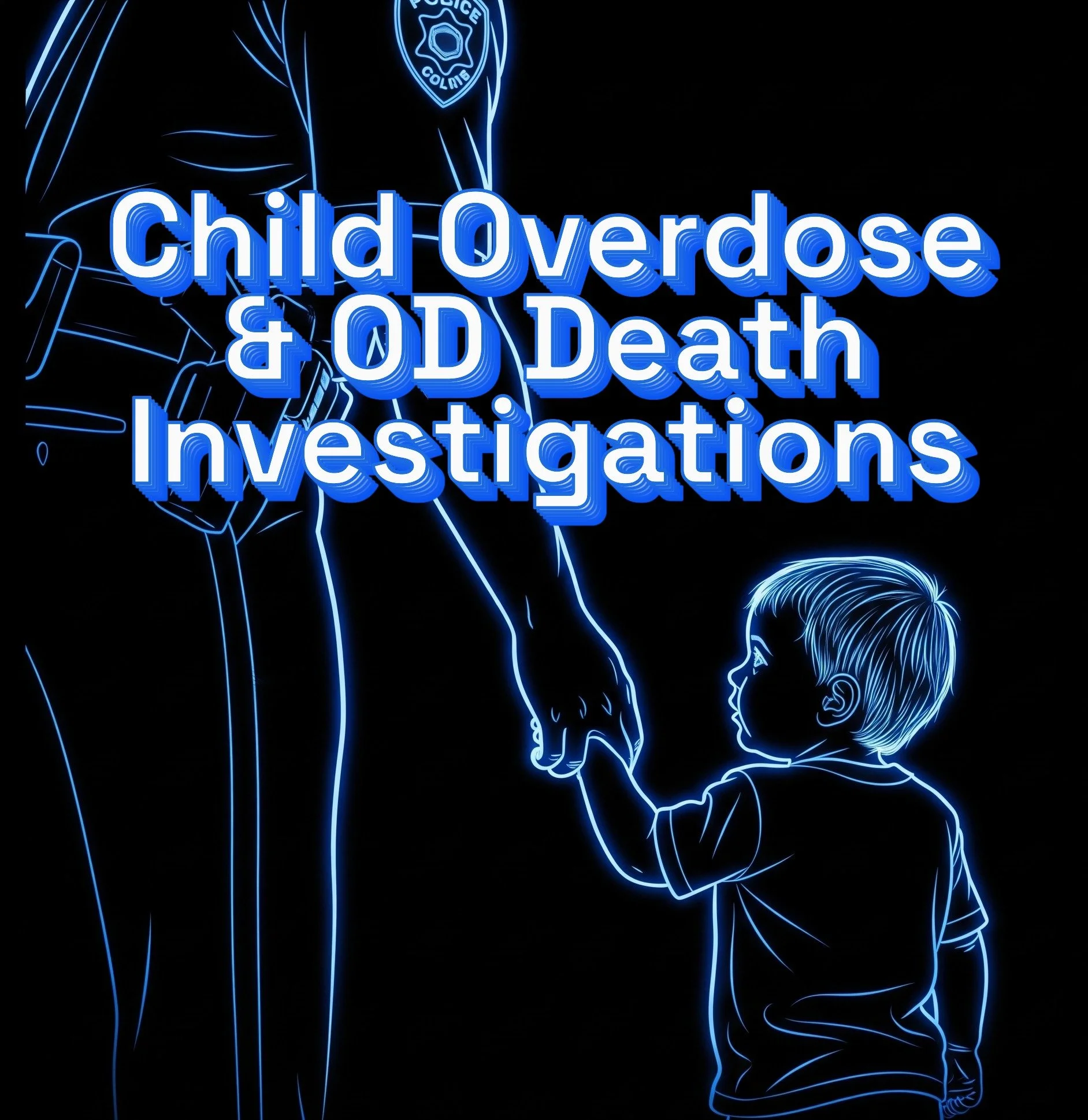

Child Overdose & OD Death Investigation Course (Intermediate)
Child Overdose and Overdose Death Investigations
This is an 8-hour intermediate level course for investigating Child Overdose and Child Overdose Death cases. These cases present their unique challenges and are relatively new (on a large scale) in the investigative world. Our course is designed to lay out the framework for working these cases from the callout to the courtroom. This course will provide investigators with the knowledge and confidence to work on these difficult cases. There are critical steps that are necessary to successfully work a child overdose or a child overdose death investigation to completion.
Key Topics Covered:
Understanding the Fentanyl Crisis: Examine the scope and impact of fentanyl in communities, including its prevalence in overdose deaths and the challenges it poses to public safety.
Learn about fentanyl – Learn what fentanyl is, what it does to the human body, and how it reacts inside the body. Learn what fentanyl addiction looks like and how to identify the paraphernalia associated with it.
Scene Management and Evidence Collection: Learn the best practices for securing overdose scenes, what constitutes evidence, collecting and preserving evidence, knowing what evidence is valuable, and utilizing personal protective equipment to ensure officer safety.
Procedures at the Hospital- Learn about the critical components that you need to know while interacting with the medical staff at the hospital.
Legal Frameworks: Explore the application of federal drug conspiracy laws and homicide statutes in overdose death cases and understand the prosecutorial strategies for holding dealers accountable.
Toxicology and Autopsy Insights: Gain knowledge on interpreting toxicology reports, understanding postmortem drug concentrations, and the role of medical examiners in determining the cause of death.
Mixed-drug toxicity and non-fentanyl overdose/ overdose death investigations.
Interview Techniques: Develop skills for interviewing witnesses, family members, and suspects, and learn what the properties are for witness and witness involvement in the case.
Developing a Cooperator: understanding if there is a need for a cooperator, how to develop a cooperator, the shelf life, and the means to use a cooperator in overdose dearth investigations.
Digital Evidence Utilization: Understand the importance of extracting and analyzing data from victims' electronic devices to trace drug sources and distribution networks.
Inter-Agency Collaboration: Learn strategies for effective collaboration with prosecutors, special units, medical examiners, and other agencies to build robust cases against those responsible for fentanyl distribution.
Preparation of Case for trial- Learn the must-have pieces for a successful prosecution and how to prepare your case. How to overcome prosecutor related obstacles.
Child Overdose and Overdose Death Investigations
This is an 8-hour intermediate level course for investigating Child Overdose and Child Overdose Death cases. These cases present their unique challenges and are relatively new (on a large scale) in the investigative world. Our course is designed to lay out the framework for working these cases from the callout to the courtroom. This course will provide investigators with the knowledge and confidence to work on these difficult cases. There are critical steps that are necessary to successfully work a child overdose or a child overdose death investigation to completion.
Key Topics Covered:
Understanding the Fentanyl Crisis: Examine the scope and impact of fentanyl in communities, including its prevalence in overdose deaths and the challenges it poses to public safety.
Learn about fentanyl – Learn what fentanyl is, what it does to the human body, and how it reacts inside the body. Learn what fentanyl addiction looks like and how to identify the paraphernalia associated with it.
Scene Management and Evidence Collection: Learn the best practices for securing overdose scenes, what constitutes evidence, collecting and preserving evidence, knowing what evidence is valuable, and utilizing personal protective equipment to ensure officer safety.
Procedures at the Hospital- Learn about the critical components that you need to know while interacting with the medical staff at the hospital.
Legal Frameworks: Explore the application of federal drug conspiracy laws and homicide statutes in overdose death cases and understand the prosecutorial strategies for holding dealers accountable.
Toxicology and Autopsy Insights: Gain knowledge on interpreting toxicology reports, understanding postmortem drug concentrations, and the role of medical examiners in determining the cause of death.
Mixed-drug toxicity and non-fentanyl overdose/ overdose death investigations.
Interview Techniques: Develop skills for interviewing witnesses, family members, and suspects, and learn what the properties are for witness and witness involvement in the case.
Developing a Cooperator: understanding if there is a need for a cooperator, how to develop a cooperator, the shelf life, and the means to use a cooperator in overdose dearth investigations.
Digital Evidence Utilization: Understand the importance of extracting and analyzing data from victims' electronic devices to trace drug sources and distribution networks.
Inter-Agency Collaboration: Learn strategies for effective collaboration with prosecutors, special units, medical examiners, and other agencies to build robust cases against those responsible for fentanyl distribution.
Preparation of Case for trial- Learn the must-have pieces for a successful prosecution and how to prepare your case. How to overcome prosecutor related obstacles.